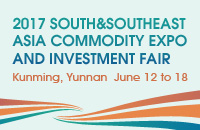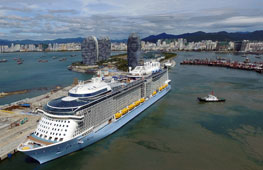Ningxia's wine industry goes global
International partners help regional sector's expansion plans, through competition using local grapes, Li Xiang reports.
China's emerging wine region in the northwestern Ningxia Hui autonomous region is rapidly gaining global attention, as local authorities seek to pool international experience and techniques with local resources, to turn the region into a notable spot on the world wine map.
The region has laid out an ambitious plan of investing at least 2 billion yuan ($300 million) to boost wine production to 200 million bottles a year with a sales value of 6 billion yuan in 2017, according to the Ningxia Grape Industry Development Bureau.
Cao Kailong, director of the bureau, said that boosting international awareness of the quality wines produced in Ningxia will help the region achieve this goal.
The local authority has been inviting international winemakers and experts to Ningxia to work with local wineries and participate in winemaking competitions.
Cao said the presence of international winemakers has helped develop the local wine industry in Ningxia, one of the world's youngest wine regions in dire need of fine winemaking techniques, professionals and winery management.
"Their presence makes us more confident that Ningxia could develop into a leading wine region in China that is capable of producing worldclass wines," Cao said.
Ningxia is the first region in China to set up a wine industry administration at the provincial level. In 2012, it joined the International Organization of Vine and Wine (OIV) as an observer.
Cao said the local government's priority is to transform the region's advantage of being a vine-friendly environment into wine production capabilities, and to develop Ningxia into a respected region in the international wine industry.
Located om the eastern foot of the Helan Mountain, the area now has about 40,000 hectares of vineyards, the second largest in the world after France's Bordeaux region and there are nearly 200 wineries in production or currently being established, according to Cao.
To meet international winemaking standards, the region has also launched a classification system and region conservation regulations.
Li Jialong, manager at Chateau Mihope, a winery invested in by Chinese billionaire He Xiangjian - founder of Chinese electrical appliance maker Midea Group - said the winery's Australian and French winemakers were impressed by the terroir of Ningxia, although the region still needs to improve its overall wine management and regulations.
"They have shared a lot of valuable experience in planting grapes, preventing diseases and managing wineries with us, " Li said.
As a fast-growing region, wines from Ningxia have made impressive achievements in international and domestic wine contests in recent years, boasting a string of international awards.
The arrival of international winemakers has also brought the press and media from their home countries to visit Ningxia, helping increase the international exposure of the region.
Gaston Sepulveda, a winemaker from Argentina, said that the local government needs to put more effort into branding and keeping up with winemaking technology.
"The wines here are very good, but it's difficult to see Ningxia's wine in the international consumer market. I think this is something Ningxia should pay attention to," Sepulveda said.













